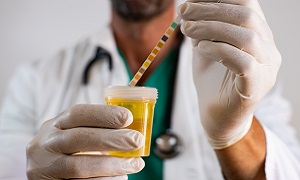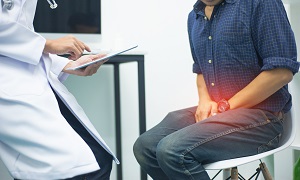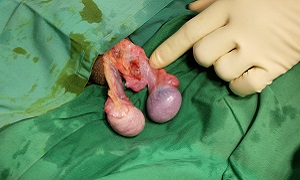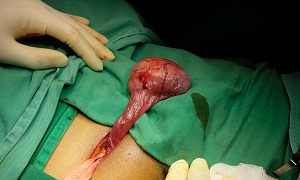Testicular Torsion
Testicular torsion is a condition that occurs when a testicle rotates and twists the spermatic cord that brings blood to your scrotum. This leads to reduced blood flow which can cause sudden and often severe pain along with swelling.
This condition is more common among adolescent males, between 12 and 18 years, though sometimes infants and older adults are infected as well.
Symptoms
Some of the signs and symptoms of testicular torsion include:
- Sudden and severe pain in the scrotum, the loose bag of skin under the penis containing the testicles
- Swelling of the scrotum
- Abdominal pain
- Frequent urination
- A testicle that has been positioned higher than normal or at an angle which seems unusual
- Fever
Young boys, who are suffering from testicular torsion, generally wake up due to scrotal pain in the middle of the night or early morning.
In cases of sudden or severe testicle pain, it is important to seek emergency care. Prompt treatment can help in the prevention of severe damage or loss of testicles, or if you have testicular torsion.
Causes & risk factors
People who have testicular torsion are generally born with a higher risk for the condition, although they might be unaware of it.
The testicles normally can’t move freely inside the scrotum, as the surrounding tissue is strong as well as supportive. Sometimes, those who suffer from torsion may have weaker connective tissue in the scrotum.
Sometimes, the condition can also be caused by a congenital trait which is known as a ‘bell clapper deformity’. If you have this deformity, then your testicles are able to move more freely in the scrotum. This movement is also able to increase the risk of the spermatic cord getting twisted. 90 percent of testicular torsion cases are caused by this deformity.
Testicular torsion may run in families as well and can affect multiple generations as well as siblings. Although the factors that contribute to a higher risk are not known, a bell clapper deformity might contribute.
According to a study, not everyone who experiences this condition has a genetic predisposition to it, although around 10 percent with testicular torsion has a family history of the condition.
Sometimes the condition can also be caused by the rapid growth of the testicles during puberty. It may also occur after an injury to the groin, such as a sports injury.
Diagnosis
Several tests can be used for diagnosis of testicular torsion, which can include:
- Urine tests
- Imaging of the scrotum
- Physical exams
Your doctor is going to perform a physical exam, after which your scrotum will be checked for swelling. They might pinch the inside of your thigh as well. This can cause the testicles to contract, though this reflex might disappear if you have torsion.
An ultrasound of the scrotum might also be recommended. This shows blood flow to the testicles. If the blood flow is lower than normal, then it is likely that you are experiencing torsion.
Treatment
Testicular torsion is a medical emergency, but most adolescents may be hesitant to inform others about pain in the testicles or to seek treatment. However, sharp and severe testicular pain should never be ignored.
There is also a condition known as intermittent torsion, which is known to cause a testicle to twist and then again untwist. Since the condition is likely to recur, seeking treatment is important even if the pain subsides.
Surgical repair, also known as orchiopexy, is generally needed for the treatment of testicular torsion. In some rare cases, your doctor might be able to untwist the spermatic cord using his/her hand. This procedure is termed as manual detorsion.
Surgery is generally performed quickly to restore blood flow to the testicles. If there is no blood flow for over six hours, it can cause the death of the testicular tissue, and this would require the removal of the affected testicle.
The surgery is performed under general anesthesia, which means you will be asleep throughout the procedure. First, your doctor will make a tiny incision in your scrotum, and untwist your cord. Then tiny sutures will be used to keep the testicles in place inside your scrotum. This helps in preventing rotation from occurring again. Then the incision is closed with stitches.
Orchiopexy generally doesn’t require an overnight stay at the hospital. You will be staying in a recovery room for several hours prior to your discharge. To help with your pain, your doctor will also prescribe you the appropriate medicine.
According to a study, around 90 percent of people who are treated for testicular torsion with 4-6 hours of the onset of pain, generally don’t require removal of the testicle.
However, if treatment is delivered after 24 hours or more, then there is a 90 percent chance that surgical removal of the testicle is going to be required.
It is to be noted that the removal of a testicle, which is known as orchiectomy, can affect the production of the hormone in infants. It also might lead to problems with fertility in the future by lowering the sperm count.
Therefore, in order to avoid such complications, if you or your child is experiencing testicular torsion, then it is important to seem emergency medical treatment right away.
Complications
Testicular torsion can lead to the following complications:
- Damage to or death of the testicle- When testicular torsion is not treated, blocked blood flow might lead to permanent damage to the testicle. If the testicle receives severe damage, it needs to be removed surgically.
- Inability to father children- Sometimes, damage or loss of a testicle can affect a man’s ability to procreate.




